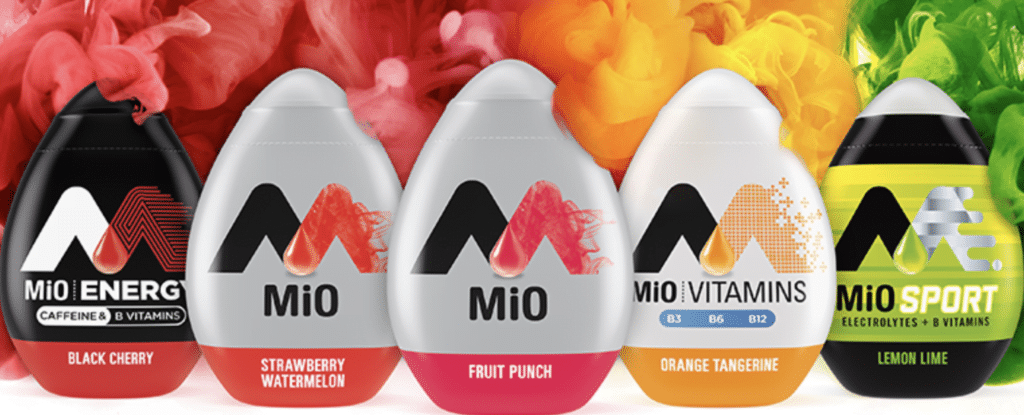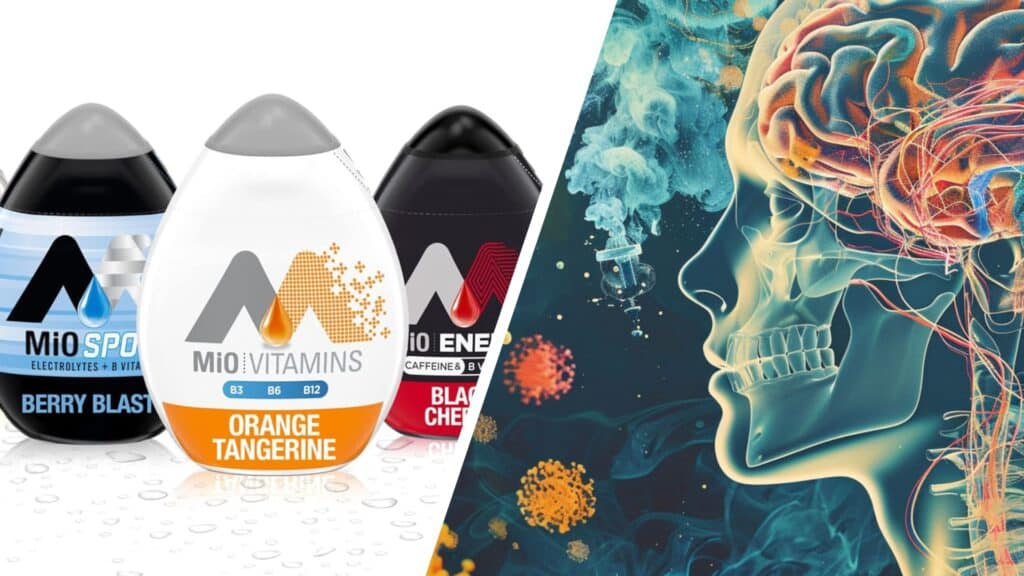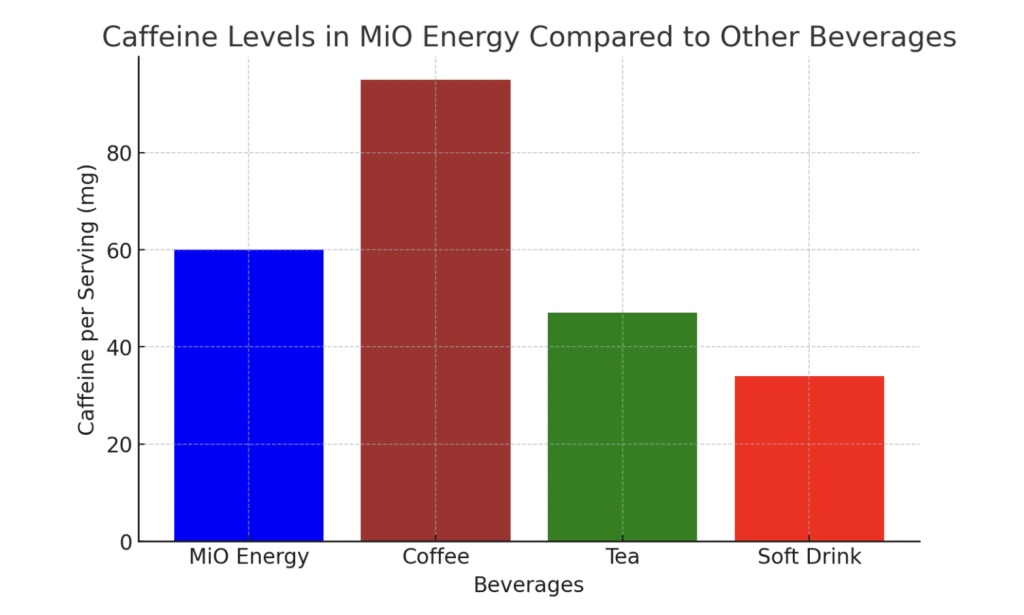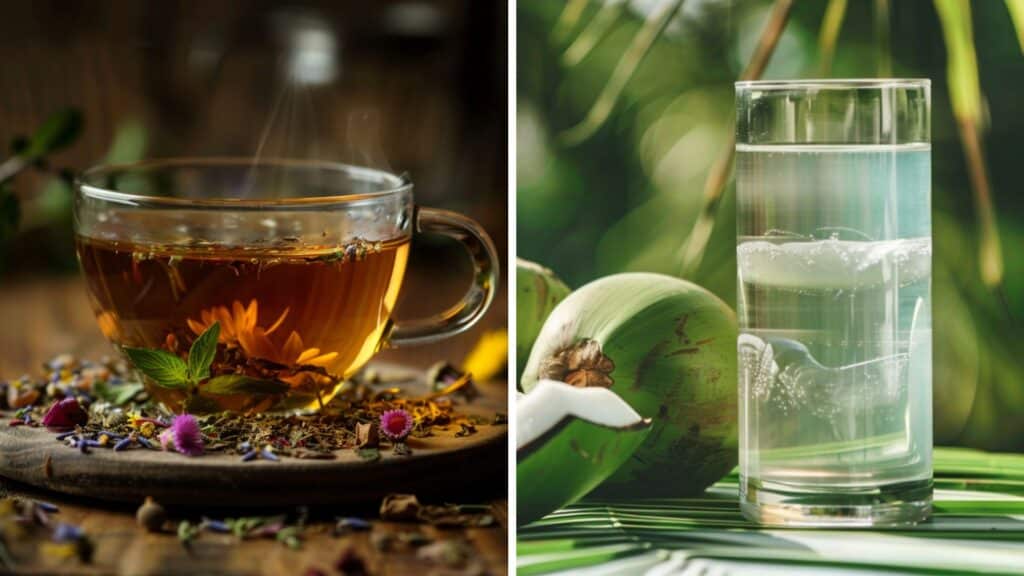Many people enjoy adding MiO liquid water enhancers to their drinks for a burst of flavor without the calories or sugar.
While these portable and convenient products may seem like a healthier alternative to sugary beverages, you might be wondering about potential drawbacks.
The truth is, consuming MiO regularly could pose certain health risks due to some of its ingredients.
In this blog post, we’ll explore the specific concerns surrounding MiO consumption, including the impact of artificial sweeteners, dyes, and preservatives on your well-being.
We’ll also discuss healthier alternatives to keep you hydrated and satisfied without compromising your health.
By the end of this article, you’ll have a clearer understanding of the potential risks associated with MiO and be equipped with the knowledge to make informed decisions about your beverage choices.
General Information About MiO

- MiO Original: The MiO Original line offers a wide range of flavors, allowing you to customize your water according to your taste preferences. With options like fruit punch, berry pomegranate, and lemonade, you can add a splash of flavor to your drinks without any calories or sugar.
- MiO Energy: Designed for those seeking an extra boost, MiO Energy contains caffeine to help you stay alert and focused. This line also includes B vitamins like niacin and vitamin B12, which play a role in energy metabolism. Flavors in this line include black cherry and green thunder.
- MiO Vitamins: MiO Vitamins cater to health-conscious individuals looking to supplement their diet. These products contain essential vitamins such as B3, B6, and B12, which support various bodily functions. With flavors like tropical cherry and orchard apple, you can enjoy a tasty drink while getting a nutrient boost.
- MiO Electrolytes: Intended for sports enthusiasts and active lifestyles, MiO Electrolytes help replenish crucial electrolytes like sodium and potassium lost through sweat during exercise. These electrolytes are vital for proper hydration and optimal performance. Flavors include arctic grape and orange vanilla.
Common Ingredients
- Artificial Sweeteners: MiO products contain artificial sweeteners such as sucralose and acesulfame potassium. These sweeteners provide a sweet taste without adding calories, making MiO an attractive option for those watching their calorie intake.
- Artificial Colors: To create visually appealing products, MiO uses artificial color additives like Red 40, Yellow 5, and Blue 1. These colors give each flavor its distinctive hue and contribute to the overall appearance of the liquid.
- Preservatives: Preservatives such as potassium sorbate are added to MiO to extend its shelf life and maintain product safety. These ingredients help prevent the growth of harmful bacteria and ensure the product remains stable over time.
Health Risks Associated with MiO Ingredients

1. Artificial Sweeteners
One of the primary health concerns surrounding MiO is the use of artificial sweeteners like sucralose and acesulfame potassium.
Studies suggest that these sweeteners may disrupt the delicate balance of the gut microbiome, potentially leading to adverse health effects.
Additionally, consuming artificial sweeteners has been associated with increased sugar cravings and potential weight gain, as they may stimulate appetite and encourage overeating.
2. Artificial Colors
MiO products contain artificial colors such as Red 40 and Blue 1, which have been linked to behavioral issues in children.
Some studies indicate that these colors may contribute to hyperactivity and attention problems.
Moreover, artificial colors can cause allergic reactions in sensitive individuals, leading to symptoms like skin irritation and breathing difficulties.
3. Preservatives
Preservatives like potassium sorbate are used in MiO to extend its shelf life and prevent microbial growth.
However, these additives may trigger hypersensitivity reactions in some people, causing symptoms such as headaches and nausea.
Long-term consumption of preservatives has also been associated with potential health risks, although more research is needed to fully understand their impact.
Specific Risks and Studies
1. Sucralose
A study published in the Journal of Toxicology and Environmental Health found that sucralose can alter insulin response and blood sugar levels, potentially affecting metabolic health.
Another study in the journal Molecules suggests that sucralose may negatively impact gut bacteria, leading to imbalances that could contribute to digestive issues and immune system dysfunction.
2. Acesulfame Potassium (Ace-K)
Research published in the journal PLOS One indicates that Ace-K may have detrimental effects on cognitive functions, particularly memory and learning.
Animal studies have also linked Ace-K consumption to metabolic disturbances, although human studies are needed to confirm these findings.
3. Artificial Colors
A meta-analysis published in the Journal of the American Academy of Child and Adolescent Psychiatry found a significant association between artificial food colors and hyperactivity in children.
The study suggests that eliminating these colors from the diet may help reduce behavioral issues in some children.
4. Miscellaneous Additives
Propylene glycol, a chemical used in MiO to maintain product consistency and stability, has been associated with potential health risks when consumed in large amounts.
Some studies suggest that propylene glycol may cause skin irritation and allergic reactions in sensitive individuals.
While the amounts used in MiO are generally considered safe, long-term cumulative exposure may be a concern for frequent consumers.
Risk Assessment by Type of MiO Product
| Product Line | Ingredients | Risks |
|---|---|---|
| Original | Water, citric acid, artificial sweeteners (Acesulfame K, Sucralose), preservatives (potassium sorbate, sodium benzoate) | Minimal, but concerns over long-term effects of artificial sweeteners |
| Energy | All Original ingredients, caffeine, taurine, guarana, ginseng | Increased heart rate and anxiety, not recommended for children or sensitive individuals |
| Vitamins | All Original ingredients, added vitamins (B3, B6, B12, C, E) | Mostly safe, potential for excess vitamin intake in certain demographics |
| Electrolytes | All Original ingredients, electrolytes (sodium, potassium) | Beneficial for hydration, excessive consumption can lead to electrolyte imbalance |
1. MiO Original
The MiO Original line contains artificial sweeteners such as sucralose and acesulfame potassium, which have been linked to potential metabolic issues and negative impacts on gut health.
Studies suggest that these sweeteners may alter blood sugar regulation and disrupt the balance of beneficial gut bacteria.
Additionally, the artificial colors used in this line, like Red 40 and Blue 1, have been associated with behavioral effects in children, including hyperactivity and attention difficulties.
2. MiO Energy
One of the main concerns with MiO Energy is its caffeine content. While caffeine can provide a temporary energy boost, it may also lead to side effects such as jitteriness, anxiety, and sleep disturbances.
Pregnant women, individuals with heart conditions, and those sensitive to stimulants should be cautious when consuming products containing caffeine.
Moreover, MiO Energy contains additional stimulating ingredients like taurine and guarana, which may further amplify the effects of caffeine and increase the risk of adverse reactions.
3. MiO Vitamins
Although the added vitamins B3, B6, and B12 in MiO Vitamins can offer some health benefits, there is a risk of over-supplementation when consuming these products regularly.
Excessive intake of certain vitamins can lead to adverse health effects. For example, too much vitamin B6 has been linked to nerve damage, while high levels of vitamin B12 may interact with certain medications.
It is important to consider the cumulative intake of these vitamins from MiO Vitamins and other fortified foods or supplements to avoid potential health risks.
4. MiO Electrolytes
The added electrolytes, particularly sodium and potassium, in MiO Electrolytes can be beneficial for individuals engaging in intense physical activities or those exposed to hot environments.
However, for people with specific health conditions like hypertension or kidney disease, the increased intake of these electrolytes may pose risks.
Excessive sodium consumption can contribute to high blood pressure, while high levels of potassium can be dangerous for those with impaired kidney function.
It is crucial for individuals with these health concerns to consult their healthcare provider before using MiO Electrolytes to ensure safe and appropriate consumption.

Scientific Perspective
FDA Stance on Artificial Sweeteners and Colors
The U.S. Food and Drug Administration (FDA) has approved the use of artificial sweeteners like sucralose and acesulfame potassium, as well as artificial colors such as Red 40 and Blue 1, in food and beverage products, including MiO.
The FDA has established Acceptable Daily Intake (ADI) levels for these ingredients, which are considered safe for consumption within those limits.
However, it is important to note that the FDA’s approval does not necessarily mean that these ingredients are entirely risk-free.
Ongoing debates within the scientific community continue to explore potential health concerns and long-term effects associated with these artificial additives.
Review of Key Studies on MiO Ingredients
Several studies have investigated the health impacts of artificial sweeteners and colors found in MiO. A study published in the Journal of Toxicology and Environmental Health found that sucralose consumption may alter glucose and insulin response, potentially affecting metabolic health.
Another study in the journal Molecules suggested that sucralose can disrupt the balance of gut bacteria, which may have implications for digestive health and immune function.
Regarding artificial colors, a meta-analysis published in the Journal of the American Academy of Child and Adolescent Psychiatry found a significant association between the consumption of artificial food colors and hyperactivity in children.
The study highlighted the potential behavioral effects of these additives and suggested that eliminating them from the diet may be beneficial for some children.
A comprehensive review published in the journal Food and Chemical Toxicology examined the safety of acesulfame potassium (Ace-K) and concluded that while the sweetener is generally considered safe, further research is needed to fully understand its long-term health effects, particularly in relation to metabolic health and potential carcinogenicity.
These studies, among others, have contributed to the ongoing scientific discussion surrounding the safety and potential health risks associated with the ingredients found in MiO.
While regulatory agencies like the FDA have deemed these ingredients safe for consumption within certain limits, it is crucial to consider the evolving nature of scientific research and the need for continued investigation into their long-term effects on human health.
Alternatives to MiO

1. Infusing Water with Natural Flavors
One of the best ways to enhance the taste of water without relying on artificial additives is to infuse it with natural flavors from fruits, vegetables, and herbs.
By adding slices of your favorite produce to a pitcher or water bottle, you can create a refreshing and flavorful drink that’s free from artificial sweeteners and colors.
Some popular combinations include cucumber and mint for a cool and invigorating taste, lemon and lime for a citrusy twist, or a mix of berries and orange slices for a fruity and antioxidant-rich infusion.
2. Using Herbal Teas
Herbal teas offer another natural alternative to flavored water enhancers like MiO. These teas can be enjoyed hot or iced, providing a delicious and aromatic beverage without the need for artificial ingredients.
Caffeine-free options like chamomile, hibiscus, and peppermint are particularly appealing for those looking to avoid stimulants while still enjoying a flavorful drink.
Many herbal teas also offer additional health benefits, such as aiding digestion, reducing stress, and promoting relaxation.
3. Incorporating Coconut Water
Coconut water has gained popularity as a natural source of electrolytes, making it an excellent alternative to sports drinks and electrolyte-enhancing products like MiO Electrolytes.
This clear liquid from young coconuts contains essential minerals like potassium, magnesium, and calcium, which help replenish the body after exercise or during hot weather.
Coconut water provides natural hydration without the added sugars, artificial colors, or sweeteners found in many commercial beverages.
Specific Recommendations for Healthier Hydration
1. Hydration Apps and Reminders
Staying hydrated throughout the day is crucial for overall health and well-being. However, it’s easy to forget to drink enough water amidst busy schedules and daily responsibilities.
Using hydration apps and reminders can help you stay on track with your fluid intake goals. These apps often allow you to set personalized targets, track your water consumption, and receive notifications when it’s time to take a sip.
By relying on technology to prompt you to drink water regularly, you can maintain optimal hydration without depending on flavored additives like MiO.
2. Sparkling Water with a Splash of Juice
For those who enjoy the fizzy sensation of carbonated beverages, sparkling water can be a healthier alternative to artificially sweetened drinks.
To add a touch of flavor without the excess sugar or artificial ingredients, try adding a small splash of natural fruit juice to your sparkling water.
This combination provides a refreshing and lightly sweetened drink that can satisfy your cravings while keeping added sugars to a minimum.
Opt for 100% fruit juices without any added sugars or preservatives to ensure you’re getting the most natural flavor possible.
Conclusion
As we’ve explored, consuming MiO water enhancers may come with potential health risks due to the presence of artificial sweeteners, colors, and preservatives.
While these products offer a convenient way to flavor your water, it’s crucial to be aware of the possible effects on your well-being.
By understanding the concerns surrounding specific ingredients and considering the risks associated with each MiO product line, you can make informed decisions about your beverage choices.
Remember, there are plenty of natural alternatives available, such as infusing water with fruits and herbs or opting for herbal teas and coconut water.
Prioritizing your health and staying hydrated with minimal additives is key. So, the next time you reach for a drink, consider the power of pure, refreshing water – your body will thank you.




